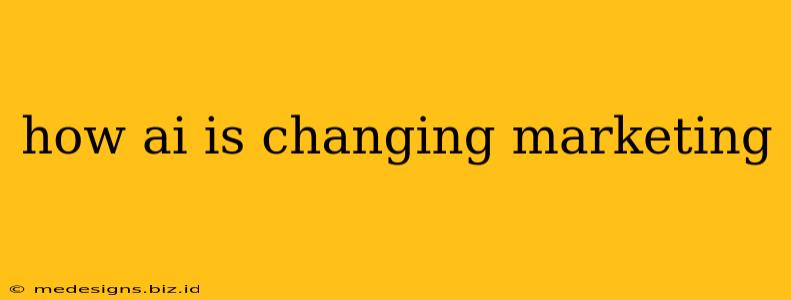The marketing landscape is undergoing a dramatic transformation, driven by the rapid advancements in Artificial Intelligence (AI). No longer a futuristic fantasy, AI is a present-day reality, reshaping how businesses connect with their audiences and achieve their marketing goals. This post delves into the profound ways AI is revolutionizing marketing, exploring both its current applications and its future potential.
AI's Impact Across Marketing Channels
AI's influence permeates every aspect of modern marketing, offering powerful tools to enhance efficiency and effectiveness. Let's explore some key areas:
1. Enhanced Customer Segmentation and Targeting:
Gone are the days of broad, generic marketing campaigns. AI empowers marketers to create highly personalized experiences by analyzing vast datasets of customer information. This allows for:
- Hyper-Personalization: AI algorithms analyze customer behavior, preferences, and purchase history to tailor messaging and offers with unprecedented precision. Imagine receiving email recommendations that are exactly what you want, before you even knew you wanted them!
- Improved Targeting: AI identifies the most promising customer segments, ensuring marketing efforts are focused on those most likely to convert. This optimizes ad spend and maximizes ROI.
- Predictive Analytics: AI predicts future customer behavior, allowing marketers to proactively address potential churn and anticipate emerging needs.
2. Content Creation and Optimization:
AI is not just automating tasks; it's assisting in the creative process itself. Tools powered by AI can:
- Generate Content Ideas: AI algorithms analyze trends and data to suggest relevant and engaging content topics. This ensures your content remains fresh, relevant, and aligned with audience interests.
- Improve Content Quality: AI can help optimize content for readability, SEO, and engagement. It can flag grammatical errors, suggest stronger word choices, and even assess the emotional tone of your writing.
- Automate Content Creation: While not replacing human creativity entirely, AI can automate repetitive tasks like generating social media posts or product descriptions, freeing up marketers for more strategic work.
3. Streamlined Social Media Management:
Managing social media presence can be incredibly time-consuming. AI tools are transforming this process by:
- Automating Scheduling and Posting: AI tools can schedule posts across different platforms, ensuring consistent engagement.
- Sentiment Analysis: AI monitors social media conversations, identifying positive and negative feedback to proactively address concerns and amplify positive sentiment.
- Chatbots: AI-powered chatbots provide instant customer service, answering questions and resolving issues 24/7, enhancing customer experience and freeing up human agents.
4. Data-Driven Decision Making:
AI’s strength lies in its ability to analyze massive datasets and extract actionable insights. This empowers marketers to:
- Measure Campaign Performance: AI provides real-time data on marketing campaign effectiveness, allowing for quick adjustments and optimization.
- Identify Trends and Opportunities: AI can identify emerging trends and market opportunities that might otherwise go unnoticed.
- Improve ROI: By optimizing campaigns and resource allocation based on data, AI helps maximize return on investment for marketing efforts.
The Future of AI in Marketing
The applications of AI in marketing are continuously evolving. We can anticipate further advancements in:
- More sophisticated personalization: Expect hyper-personalization to become even more nuanced and seamless, creating truly one-to-one marketing experiences.
- Increased automation: Repetitive tasks will be increasingly automated, freeing up human marketers to focus on creative strategy and building relationships.
- Ethical considerations: As AI becomes more integrated into marketing, addressing ethical concerns around data privacy and algorithmic bias will be crucial.
Conclusion: Embracing the AI-Powered Future of Marketing
AI is not replacing human marketers; it's augmenting their capabilities. By embracing AI tools and strategies, marketers can unlock unprecedented levels of efficiency, effectiveness, and personalization, ultimately leading to stronger customer relationships and improved business outcomes. The future of marketing is AI-powered, and those who adapt and innovate will thrive in this rapidly changing landscape.
